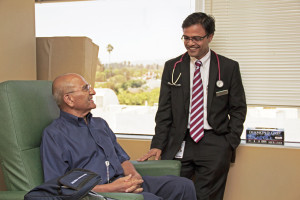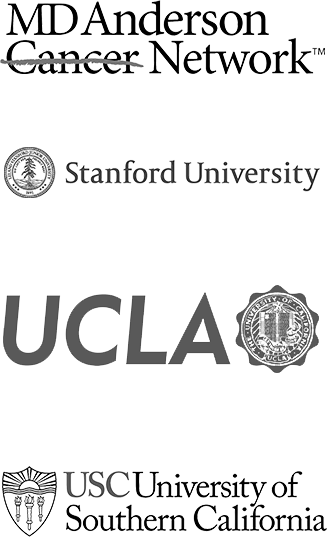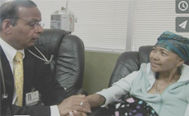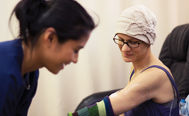Blood Cancer in Los Angeles
There are several different forms of blood cancer. Some of the most common symptoms of blood cancer include:
- Pain in the upper abdomen
- Bone fractures from minimal trauma
- Bone or joint pain
- Bruising or bleeding easily
- Enlarged liver and glands (spleen and lymph nodes)
- Night sweats
- Unexplained weight loss
- Frequent infections
- Frequent urination
- Fatigue
- Fever and chills
- Nausea (upset stomach, car-sickness, sea-sickness, wooziness, queasiness, retching)
Advanced forms of blood cancer can produce life threatening symptoms that require immediate attention such as:
- High fever (over 101 degrees Fahrenheit)
- Tachycardia (rapid heart rate)
- Seizure
- Heavy, uncontrolled breathing
- Severe abdominal pain
- Bluish lips or fingernails
- Fainting and unresponsiveness
- Sudden changes in behavior or mental state, including confusion, delirium, lethargy, hallucinations, and delusions
- Chest pain, tightness, pressure, and palpitations
- Shortness of breath
- Difficulty breathing
- Labored breathing
- Wheezing
Different Types of Blood Cancer in Los Angeles
According to the Leukemia & Lymphoma Society, a new case of blood cancer is diagnosed in the United States each year. The main forms of blood cancer are:
Leukemia
Leukemia is a form of blood cancer that affects the bone marrow and lymph nodes (lymphatic system). There are different types of leukemia, some of which are more common in children. Patients with leukemia produce abnormal white blood cells, compromising the body’s ability to naturally fight off disease and infections.
Lymphoma
Lymphoma affects the cells of the immune system, and is divided into five main categories:
- Hodgkin Disease
- Non-Hodgkin Lymphoma
- Non-Hodgkin Lymphoma in Children
- Lymphoma of the Skin
- Waldenstrom Macroglobulinemia
Myeloma
Myeloma affects the plasma cells, and causes cancer cells to accumulate in the bone marrow and compromise healthy blood cells. Abnormal myeloma cells can lead to kidney problems.
Myelodysplastic Syndromes
This disorder occurs as a result of damaged and malfunctioning blood cells stemming from a problem with the bone marrow, and may require a bone marrow transplant as treatment. The general symptoms of myelodysplastic syndrome are:
- Anemia-related pallor (paleness in the face)
- Petechiae – bleeding below the surface of the skin, detectable through tiny red spots on the skin
- Shortness of breath
- Fatigue
- Frequent and easy bruising and bleeding
- Frequent infections
Blood Cancer Treatment in Los Angeles
Research into new cancer treatments have made remarkable and groundbreaking progress in the last few decades, particularly in the area of understanding the role of genetics and biomarkers on the onset and progression and development of cancer. Blood cancer is no exception.
The board-certified oncologists and cancer specialists at the Cancer Center of Southern California in Los Angeles are industry leaders in research and clinical trials into cutting edge, effective new treatments to help treat, manage, cure, and prolong the lifespan of blood cancer patients.
The standard treatments for blood cancer are:
- Radiation
- Chemotherapy
- Bone marrow transplant
There is no one-size-fits-all treatment approach to blood cancer, which in many cases presents and develops as a cluster of related blood disorders and conditions. Obtaining competent, comprehensive cancer care as early as possible is the priority for all patients.
Next, read more about Chemotherapy for Leukemia.


